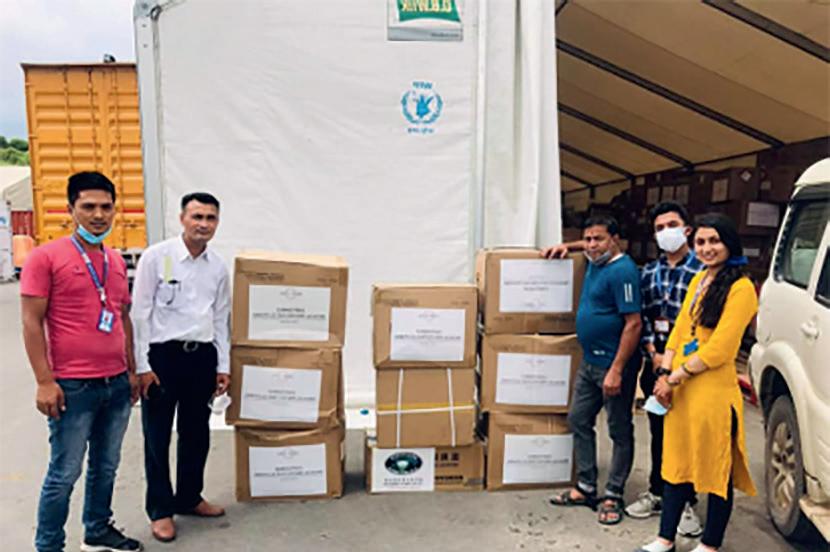
3 minute read
HSE aid for overseas
HSE donations assist in COVID crises in Asia, Africa and South America
PPE from Ireland arriving at a health post in Nepal. Loading equipment for India at Dublin Airport
Towards the end of April, Irish TV screens revealed the unfolding crisis in India as health facilities ran out of oxygen desperately needed to treat thousands of sick people with COVID-19 infection. Late on Friday evening on April 23rd, Dr David Weakliam, HSE Global Health Programme Director, received a call from Dr Vida Hamilton, HSE Clinical Adviser, to say that the HSE was in a position to donate oxygen concentrators – but how could we get them to India?
He immediately contacted the Department of Foreign A airs (DFA) to seek support for transportation. What followed was a rapid, co- ordinated response involving many people across the HSE, DFA, Department of Housing, Department of Health, and Indian Authorities in Dublin and Delhi.
By Sunday afternoon, HSE sta had 700 oxygen concentrators ready for shipping, the customs documentation was completed, and funding was secured from DFA and the EU under the EU Civil Protection Mechanism. On Tuesday, a plane arrived at Dublin Airport and departed that night for Delhi. A second, larger donation followed the next week with 548 oxygen concentrators, 425 ventilators and 2 oxygen generators. This huge consignment filled a Boeing 747. This arrived in Delhi on 4th May and remarkably, just two days later on May 6th, the HSE received an email from the Indian Ambassador in Dublin with details of the distribution of every piece of equipment to various hospitals across India.

BELOW: Minister of State Colm Brophy; Marcel Biato, Brazilian Ambassador; Dr David Weakliam, HSE Global Health Programme; Helen Byrne, HSE Acute Hospitals; and Paul Rock, NDFEM.

The HSE made further donations over the following weeks. Nepal, a poorer country than its neighbour India, requested international assistance and again the HSE promptly responded. Despite the disruptions to communications following the HSE cyber-attack, clinical engineers and other sta worked flat out to organise a donation of 1800 items of respiratory equipment and more than two million items of PPE. The Irish Red Cross and other non-governmental organisations contributed additional oxygen concentrators and Respicare supplied non-invasive ventilators. This consignment was despatched in June.
The HSE further responded to an emergency request from Brazil for Atracurium, an essential muscle-relaxing drug for COVID-19 patients requiring ventilation. This was a more challenging process due to complex customs processes and the requirement for refrigeration. 47,250 vials of Atracurium were successful donated in June.
The HSE continues to support other countries as it is able. In response to the challenge of global vaccine equity, the HSE collaborated with the Departments of Health and Foreign A airs to send 335,500 doses of the Astra Zeneca vaccine to Uganda in September. In October, the HSE sent two containers of PPE to Zambia and was preparing to respond to further requests for PPE from several other countries in Africa.
These are examples of how the HSE has played a significant role in sharing resources as part of Ireland’s global solidarity with less well-resourced countries during the COVID-19 pandemic.
David Weakliam summed up the response of the HSE and its sta . “In saying ‘we are all in this together’ we demonstrated our commitment to people everywhere and not just in Ireland. This is true solidarity, not just doing something because it is in Ireland’s interest (‘no one’s safe until we’re all safe’), but because we genuinely care what is happening in other countries and we believe that everyone has a right to the health care they need, wherever they are in the world,” he said.
BELOW Loading equipment for India at HSE warehouse











